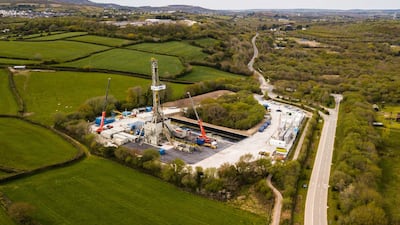Geothermal energy – digging for heat from deep under the Earth’s surface – has been tipped for a revival in Britain as the country looks for greener ways to keep warm.
The two giant greenhouses of Cornwall’s Eden Project will be heated by the first deep geothermal well to begin operating in the UK decades, it was announced this week.
Engineers have drilled the 4.9-kilometre well so that hot water can be lifted out and piped into the greenhouses at 85°C. Once it cools, it is recycled in the high temperatures underground.
The process is considered renewable because heat is replenished by natural radioactive processes under the Earth’s surface.
“However humans work at it, we will not cool the Earth. The Earth will still be hot in five billion years,” geologist Jon Gluyas of Durham University’s energy institute told The National.

The principle is not so different from ancient Roman aristocrats “taking the waters” in the English spa city of Bath, whose abbey has more recently put the area’s natural springs to use for heating.
Not everywhere has this lucky geology, and drilling deep underground is expensive. That means geothermal projects have high upfront costs, and a barrel of hot water is not as lucrative as oil or gas.
The UK looked at geothermal after the 1970s oil crisis but ultimately lost interest and only one borehole, in Southampton, was put into long-term use.
Yet while Britain may not have the ideally suited volcanoes and hot springs of Iceland, fans of geothermal say the UK could at least emulate neighbours such as France and Germany in finding new ways to keep warm.

District heating
Southampton’s geothermal well, although currently closed for repairs, can feed heat into a communal network that supplies homes, shops and public buildings.
District heating like this is relatively rare in the UK, but is earmarked for a boom as Britain looks for alternatives to the gas boilers that most households currently use.
Nearly half the UK’s natural gas supply is used for heating and this accounts for about 25 per cent of Britain’s greenhouse gas emissions, according to government figures.
Geothermal energy was described as “the sleeping giant of renewables – lying not under our noses but literally under our feet” by Sir Tim Smit, the Eden Project’s co-founder.
Mr Gluyas recently co-wrote a report commissioned by Conservative MP Kieran Mullan that identified dozens of areas in Britain that would be suitable for geothermal drilling.
It said the UK would have the geothermal potential to meet its heating needs for 100 years even if the hot water was never recycled.
“Getting to net zero by 2050 is going to require us to pull every possible lever,” said Mr Mullan.
Drilling is not the kind of thing environmentalists tend to love and a 1.7-magnitude tremor during testing at the Eden Project was felt by locals.
The industry's retort is that there are natural faults in the Earth and that this is not the kind of high-pressure fracking that should cause alarm. Another argument in geothermal's favour is that it takes up fairly little space above ground.
“It’s extremely sustainable. It’s always on, as well,” said Mr Gluyas of geothermal energy.
“It’s also, for the most part, ultra-low carbon or even zero carbon.”
The “always on” matters because solar and wind power rely on suitable weather and an economy such as Britain’s still needs a “baseload” for when it is dark and still.
Gas currently fills that role but is a fossil fuel and also subject to shocks such as Russia’s war in Ukraine.
Another option is nuclear, although it divides opinion as an electricity source and the idea of using it as a local heat source is still in development.
Heating is the main focus of a geothermal review that Mr Mullan handed to Prime Minister Rishi Sunak.
“Heat doesn’t travel very well. When you talk heat, you need to think quite locally,” Mr Gluyas said.
This means providers need a solid customer base since heat cannot be repurposed elsewhere as easily as electricity. The UK’s regulatory landscape is uncertain. Investors would also like to see strong returns.

The drilling at the Eden Project involved raising £24 million ($26.2 million) from private backers and a European development back that allocated funds before Britain cut ties with the EU.
Another Cornwall project that could heat 4,000 homes is backed by a further £22 million in public money. In the US, there are tax credits for geothermal under President Joe Biden’s $369 billion Inflation Reduction Act.
Mr Gluyas believes momentum is gaining behind geothermal as the UK’s net-zero push coincides with a drive for home-grown energy after the gas crisis caused by Russia.
He says the UK is still using “early generation stuff” that has room to improve when it comes to energy efficiency – another lion in the path of the UK’s push for clean heating.
“A Victorian or Edwardian or older house in the UK is designed to let air out because you would have had a coal fire there and you needed the ventilation,” he said.
“That’s another side of this equation. Our building standards in the UK are very poor indeed, by any standard in a developed country.”


